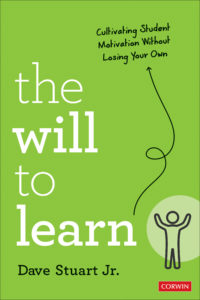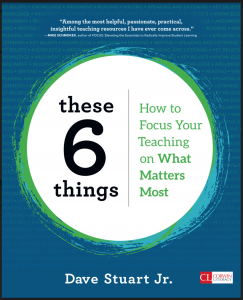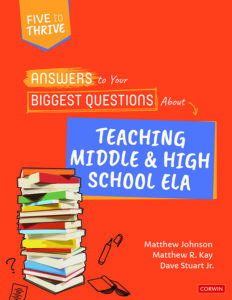I'm a teacher who writes. This is the page where you can find everything I've written. With every article I write, my goal is to help you (and me) grow more effective and more stable in our work with students. More learning, less stress: that's the gist of my work.
New articles are sent to my popular (and free) email newsletter. Below, you'll find links to everything I've written to date. Since it's a lot (nearly 900,000 words), I'll start with some of my more popular posts.
My best work on fundamental and timeless teacher issues
What's the deal with student motivation?
As of 2023, I've got a book out that provides my most comprehensive and practical take on student motivation. It's ideal for secondary faculties and is written by a teacher for teachers. I don't think you'll find anything deeper or more explanatory on this topic anywhere. The book is called The Will to Learn, and you can learn more about it here or click on the picture of the book at right.
If you'd prefer the free route, you'll find a blog series I did on this topic while preparing to write the book. Those links are below.
Either way, grab a cuppa and let's do this.
- Series Intro, Part I: On the Teaching of Souls
- Series Intro, Part II: The Path to the Head is the Heart
- Series Intro, Part III: Five Critical Qualities about the Five Key Beliefs, in Order of Actionability
- Credibility Guide: Three Simple, Robust Strategies for Building the Credibility Belief
- Value Guide: Three Simple, Robust Strategies for Building the Value Belief
- Effort Guide: Three Simple, Robust Methods for Establishing Effort
- Efficacy Guide: Three Simple, Robust Strategies for Building the Efficacy Belief
- Belonging Guide: Three Simple, Robust Strategies for Building the Belonging Belief
What's the deal with teacher motivation?
I'm currently working through my most comprehensive take yet on the fundamentals of our motivation — mine and yours, us educators. This is waaaay deeper, more useful, and more robustly hopeful than the stuff you typically read on burnout or self-care.
- Series Intro, Part I: The Teacher's Journey: A Deeper, Better Way of Thinking (and Doing Something) about Burnout and Demoralization
- Series Intro, Part II: Efficiency Hasn't Saved Us
- Series Intro, Part III: The Mechanics of Teacher Burnout (AKA the Workload-Pressure Cycle)
- Series Intro, Part IV: A Strategic, Smart Approach to Depressurizing the Teacher Soul
- Depressurizing the Teacher Soul Mini-Guides:
- On Exercise: “All or Nothing” Exercise Exhausts the Soul
- On Emotionally Honest Support Groups: Groups Where We're Known
- On Swearing Off Judgment: The Day Mr. Rogers Stopped Judging
- More to come!
Helpful Books
This blog can be very overwhelming, as it contains all of my rough draft thinking as a classroom teacher-writer since I started writing publicly in 2012. Thankfully, there's now a polished and refined version of much of what I had written on the blog as of 2018. It's called These 6 Things: How to Focus Your Teaching on What Matters Most.
I'm grateful to report that These 6 Things has been called “a how-to guide for teaching with your head and your heart” and “among the most helpful, practical, insightful teaching resources” available. It's been read and appreciated by middle school math teachers in California, college writing instructors in Idaho, heads of schools in Dubai, and elementary teachers in Michigan. It's the shortest path into understanding how I think about and approach our work as educators.
If you don't have a year to sift through my blog, consider getting the book, first for you and then for your team
The first chapter is here — no opt-in required.
In June 2022, two colleagues and I released another helpful book, this one specifically for secondary English Language Arts (ELA) educators.
These two colleagues are truly excellent. Matthew Kay is the author of the bestselling Not Light But Fire: How to Lead Meaningful Race Conversations in the Classroom and Matthew Johnson is the author of Flash Feedback: Responding to Student Writing Better and Faster, Without Burning Out. When writing this book, we each wrote to our strengths and aimed at completing a resource we wish we had had when starting out as ELA teachers. We hope it helps.
You can get it here.

And finally, in May 2023 I came out with what I meant to be a timeless entry in the literature on student motivation. I'm not a “publish tons of books” guy. I only plan to write books that I believe will be so helpful that they must be put out into the world. The book is called The Will to Learn.
You can get it here.
Most Popular
Keeping in mind that popular doesn't always mean best, these are articles that've been shared and read by lots of thousands of educators like you and me.
- Mechanics Instruction that Sticks: Using Simple Warm-Ups to Improve Student Writing
- Latin Word Chunks: A Case Study in Smart, Low-Stress Knowledge-Building
- Nine Instructional Moves for Teaching Texts
- Beyond the Fear of Public Speaking: Making the First Pop-Up Debate a Success for All Students
- The 300-Word Guide to Long-Term Flourishing
- 9 Principles for Working Better with Fellow Educators
- There Are No Silver Bullets, but There Are Swords
- Purposeful Annotation: A “Close Reading” Strategy that Makes Sense to My Students
- There and Back Again: My Journey with Gallagher’s Article of the Week Assignment
Search My Writing
Here's a tool for searching my blog.
Elsewhere on the Web
I have not spent much time or effort writing for other outlets, but what I have written (or been featured in) you can find below:
- KQED re: relationship repair
- The Marshall Memo: Issues #845, 847, 848, 870, 874, 917, 970, 971
- Edutopia
- NEA Today: “Who Stands Between Fake News and Students? Educators”
- “The Best of Our Knowledge” radio interview, titled “So You Wanna be a Teacher”
- The National Speech and Debate League's Rostrum Journal, Nov/Dec 2019
- The DonorsChoose.org blog
- The Language Arts Journal of Michigan: Volume 34, Issue 2
I've also been on a few podcasts:
- Cult of Pedagogy w/ Jenn Gonzalez
- Truths for Teachers w/ Angela Watson
- Mere Christians w/ Jordan Raynor
- Teacher to Teacher
- On the Right Road Radio w/ Paula Phillips
- Thrive Thursday w/ Doug Fisher and Nancy Frey
- Class Dismissed w/ Nick Ortego
- Writing Matters w/ Troy Hicks
- Talks with Teachers w/ Brian Sztabnik
- One Percent Better w/ Joe Ferraro
- John Poelstra Show w/ John Poelstra
- The Distilled Man w/ Kyle Ingham
- Life on Brand w/ Hien Lam and Matt Hansen
- CBD Podcast w/ Peter Grostic (and here's a Part 2)
- The Chromebook Classroom w/ John Sowash
The Full List: 1,000+ articles, 1,000,000+ words
And finally, here's a list of all of my articles are in chronological order. Enjoy.



 )
) It's the Final Countdown
It's the Final Countdown 


 (But LOTS of Teachers Misunderstand and Overcomplicate It)
(But LOTS of Teachers Misunderstand and Overcomplicate It) Exciting News
Exciting News and Eat It, Too
and Eat It, Too Answers to Your Biggest Questions About Teaching Middle and High School ELA
Answers to Your Biggest Questions About Teaching Middle and High School ELA
 )
)
 Argumentative Writing that Actually Listens to the Other Side
Argumentative Writing that Actually Listens to the Other Side